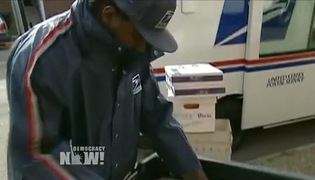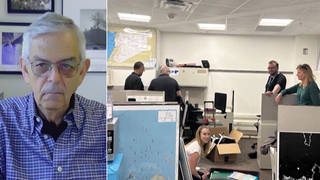
Guests
- Andy SullivanReuters correspondent who wrote a lengthy report on Mitt Romney’s tenure at Bain Capital.
- Joe Sopticformer steelworker at Kansas City’s Worldwide Grinding Systems, which went bankrupt under the ownership of Mitt Romney’s firm Bain Capital.
As Republican presidential candidate Mitt Romney comes under fire in New Hampshire for touting his business experience, we look at how his private equity firm, Bain Capital, drove a Kansas City steel plant into bankruptcy, leading to some 750 layoffs and a federal bailout. Bain still walked away with millions of dollars in profits. We speak with Reuters reporter Andy Sullivan, who covered the story, and with Joe Soptic, a steelworker who lost his job at Kansas City’s Worldwide Grinding Systems steel mill after 28 years. “The first thing I noticed after the company was bought out … they became very union-non-friendly. I mean, they started looking for ways to eliminate jobs,” says Soptic. “In my department, they actually offered to buy our jobs out from underneath us. They cut back on safety equipment.” Regarding Romney’s business acumen, Soptic adds, “If he would run the country the way that he ran our business, I wouldn’t want him in there as president.” [includes rush transcript]
Transcript
AMY GOODMAN: Republican voters in New Hampshire head to the polls today for their state’s primary, the first in the nationwide contest to select President Obama’s challenger in the November elections.
Massachusetts Governor Mitt Romney has been fighting to maintain his front-runner status amidst ongoing scrutiny of his tenure at the helm of private equity firm Bain Capital. After repeatedly touting his business experience as an asset towards reviving the U.S. economy, Romney has been put on the defensive in recent weeks over Bain’s use of tax havens as well as causing thousands of layoffs through buyouts and restructuring. Romney has continued to receive millions of dollars from Bain, despite having left the company in 1999.
On the eve of the New Hampshire vote, Romney unintentionally provided campaign fodder to his rivals with an offhand remark. Touting his health policy as a means to increase competition among health insurers, Romney said he likes to fire people.
MITT ROMNEY: I want individuals to have their own insurance. That means the insurance company will have an incentive to keep you healthy. It also means that if you don’t like what they do, you can fire them. I like being able to fire people who provide services to me.
AMY GOODMAN: Romney’s lead in New Hampshire has narrowed amidst the focus on his time at Bain. Hoping to revive his campaign, former House Speaker Newt Gingrich has criticized Romney for the job losses under Bain.
NEWT GINGRICH: The article apparently outlined in detail that Bain Capital acquired a company, in essence, looted it and then laid off 1,700 people. Now, if that’s accurate, and if there are three or four or five examples like that, I think that’s troubling. I don’t think—those of us who believe in free markets and those of us who believe that in fact the whole goal of investment is entrepreneurship and job creation would find it pretty hard to justify rich people figuring out clever legal ways to loot a company, leaving behind 1,700 families without a job.
AMY GOODMAN: Not all of Romney’s rivals see his tenure at Bain as a potential liability. On Monday, former Senator Rick Santorum, the winner of last week’s Iowa caucus, refused to criticize Romney’s work at Bain.
RICK SANTORUM: If capitalism is constructive as well as destructive, and I don’t see that as necessary—I think he’s got a lot more about his record as governor to talk about than his record at Bain Capital.
AMY GOODMAN: That was Rick Santorum.
Well, to discuss Mitt Romney, we’re going to start in Washington, D.C., with Andy Sullivan, a Reuters correspondent who has just written an extensive piece on how Bain drove a Kansas City steel plant, Worldwide Grinding Systems, into bankruptcy, leading to some 750 layoffs and a federal bailout. Bain still walked away with millions of dollars in profits. And then we will go to Kansas City to speak with one of the workers, a former steelworker who was fired.
Andy, lay out the story that you have just released.
ANDY SULLIVAN: Hi, Amy.
Well, we took an in-depth look at one of Bain’s transactions when Romney was in charge. The company bought a steel mill in Kansas City in the early 1990s. They put up $8 million. They got other investors to kick in money. Total cost was about $80 million. And the idea was to improve the steel mill and to have upgrades and have it operate more efficiently. But one of the first things they did was issue $125 million in debt at a pretty high interest rate of 12 percent. And they gave themselves a buyout of about $65 million out of that. So they made their money back quickly. We talked to a lot of folks—analysts, former company executives—who said that this amount of debt really sort of made it hard for the company to survive tough times a few years later down the road.
AMY GOODMAN: Would you say that Bain’s downfall was as a result of faulty business practices?
ANDY SULLIVAN: I would—I mean, some—a lot of the analysts we talked to said that it certainly didn’t help. And one of the most interesting interviews I did for this story was a former executive of the company, Roger Regelbrugge. He took over in 1995 when it was merged with another company. He took one look at the balance sheet, and he said, “Well, if you guys aren’t going public in two years, I need to get out of here, because otherwise we’re going to have to restructure, and that’s really painful. That’s no fun. We lay people off. I argue with creditors. And I don’t want to do that.” So, I mean, if he was saying that, that—I think that tells you something.
AMY GOODMAN: Who most benefited at Bain? Who profited?
ANDY SULLIVAN: Who profited? Well, Bain took the profits, about $12 million plus another $900,000 a year for their consulting arm. And that money goes to people who invest in Bain, and that’s everything from pension funds to individual wealthy investors. Romney has made this point that if—that Bain actually helps people who have retirement accounts. So, you know, Amy, perhaps you benefited, perhaps I benefited, if we have 401(k)s.
AMY GOODMAN: And what about Mitt Romney?
ANDY SULLIVAN: Well, Mitt Romney is running for president on the strength of his business record. He’s talking—this time around, he’s talking less about his record as governor of Massachusetts. And his argument is that “I have the know-how to fix the American economy.” So, while it’s not surprising that we’re having this debate, it perhaps is a little surprising that we’re having this debate so early in the campaign, when Republican rivals are going after him. They’ve been expecting that from President Obama.
AMY GOODMAN: At a Chamber of Commerce breakfast yesterday in Nashua, New Hampshire, Romney was questioned by United Auto Workers regional director Julie Kushner about why he objected to the Obama administration’s bankruptcy plan for General Motors.
JULIE KUSHNER: How can you say that those people, people from your own state of Michigan, would have been better off under bankruptcy, where they would have really very likely lost their jobs, instead of where they are today, at once again the number one auto company in the United States? I don’t understand—
MODERATOR: Ma’am, we’ve been very patient. We need to get to the answer now. Thank you.
MITT ROMNEY: OK, now let’s get to the answer. The answer is this. Bankruptcy is not going under and losing jobs. The President ultimately did what I suggested: going through a managed bankruptcy process. I wrote an op-ed about this. I said—excuse me, it’s my turn to talk. And if you want to talk afterwards, we can come chat afterwards. But we went through a—General Motors and Chrystler went through a managed bankruptcy, exactly as I said back, I think it was, in November. It took the President five or six months to come around to that. That’s what they had to do.
AMY GOODMAN: That was Mitt Romney answering Julie Kushner’s question, regional director of the UAW, in Nashua, New Hampshire.
Joining us now from Kansas City is Joe Soptic, former steelworker at Worldwide Grinding Systems, who has lost his job after a declared bankruptcy under Bain’s control. He’s speaking to us from Kansas City’s PBS station KCPT.
Joe, explain what happened.
JOE SOPTIC: Well, I guess the first thing I noticed after the company was bought out by GST, they became very union-non-friendly. I mean, they started looking for ways to eliminate jobs. In my case, in my department, they actually offered to buy our jobs out from underneath us. They cut back on safety equipment. You know, the working environment just wasn’t as good as
it should be.
AMY GOODMAN: You worked at the plant for 28 years? Explain how it changed.
JOE SOPTIC: Well, one of the big things that I noticed was they didn’t maintain the equipment. The electric arc furnaces, when they broke down, sometimes they would sit for two or three days or a week before they had parts. When AK Steel owned the company, everything was well maintained. The transportation department, all of the equipment that we had to use to haul things around the plant, a lot of it would break down, and so, you know, they would use that as an excuse to bring in outside contractors, non-union contractors. You know, they were after—they were constantly after our jobs.
AMY GOODMAN: What happened to your 401(k)?
JOE SOPTIC: The 401(k), well, I don’t think our 401(k) was affected. Our retirement was affected. When they went—when we had the—when we got the bankruptcy deal, I lost $400 off of my retirement, because the pension fund was underfunded.
AMY GOODMAN: Every month.
JOE SOPTIC: Yes, every month.
AMY GOODMAN: You lost $400. And what happened to your family?
JOE SOPTIC: Yeah. Well, basically, what happened, my wife had to quit working, and we didn’t have any health insurance on her. I went to work for a suburban school district, so I had health insurance, but I had to start out at substantially less money. I went from about $59,000 a year down to $24,800 a year. And I couldn’t afford health insurance on her. And she became ill, and we discovered that she had cancer. And, you know, we had no health insurance. So, the only recourse that I had was we took her to a county hospital. And unfortunately, she passed away from the cancer. And when she did, I had this big bill. And the only way that—the county had agreed that they would cover the bill, but I had to liquidate all of my 401(k)s. So I lost my 401(k)s.
AMY GOODMAN: And yet, Romney defended Bain Capital by saying that profits went to regular people’s 401(k)s. What message do you have, overall, for Mitt Romney, as he runs for president of the United States?
JOE SOPTIC: Well, I’ll tell you how I feel, is that if he would run the country the way that he ran our business, I wouldn’t want him in there as president—
AMY GOODMAN: And Andy Sullivan—
JOE SOPTIC: —because I don’t think he has any sympathy for the average working person.
AMY GOODMAN: Andy Sullivan, last comment on your major revelation, what you were most surprised by in your piece on Bain?
ANDY SULLIVAN: Well, I think this ties in with what Joe is talking about. A big liability for the company all along was its promises to employees—its pension funds, its healthcare benefits and things like that. When Bain bought the company, they worked out an agreement that the previous owner would cover these for a few years. That expired, and the union worked out a new negotiation, where if the plant closed—
AMY GOODMAN: We have four seconds.
ANDY SULLIVAN: —Bain would pay for them. OK, well, then they went bankrupt, and people like Joe were left out in the cold.
AMY GOODMAN: Andy Sullivan, Joe Soptic, thanks for joining us.












Media Options